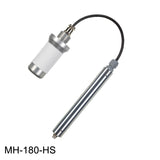Biological Incubators

Our CO2 sensors are used for cell culture incubators to provide an optimum environment to promote growth.
Benefits of CO2 detectors in incubators and life science applications:
They are heat sterilized to 190°C, creating less contamination. They also include integrated temperature and pressure compensation, giving reliable CO2 measurements across a range of aggressive conditions.
Why CO2 incubators are used for cell cultures?
For many laboratory managers, researchers, and scientists; CO2 incubators are mostly used in life sciences, medical research, and pharmaceutical industries. However, they also provide sterile conditions for cultivation in fields where cells must grow in a completely germ-free environment.
Thus, having a CO2 sensor that can provide consistent levels throughout the incubation process is vital in order to maintain proper control of pH levels and manage ideal cell or tissue growth.
What CO2 level should a cell culture incubator be at?
Humans are most comfortable at CO2 levels at or slightly above 400 ppm (0.04%). This raises the question, why would a CO2 incubator that is used to grow tissue cultures need CO2 levels of 5 - 10%? To keep culture cells under optimum conditions, the media they grow in needs to stay at neutral pH - around pH 7.
Some of our partners include:



